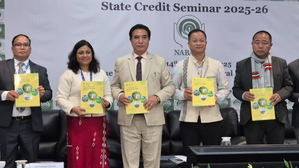NABARD’s interventions bring transformative changes to rural communities: Mizoram CM
Aizawl, Feb 14, 2025, IANS
 Aizawl, Feb 14 (IANS) Mizoram Chief Minister Lalduhoma on Friday said that over the years NABARD's interventions have brought transformative changes to rural communities in the state. Addressing a seminar here, the Chief Minister said that in the last many years, NABARD's involvement in many ways such as via the assistance in the development of rural infrastructure, promoting micro enterprise, fostering financial inclusion for marginalised or implementation of various developmental programs have brought transformative changes to rural communities. He mentioned that over the years, NABARD has also been a critical partner in helping farmers adapt to new agriculture technologies, ensuring better market access and improving the overall quality of life in rural areas. In the seminar, NABARD unveiled a 'State Focus Paper-2025-26' highlighting its plans and schemes for the development of agriculture, its allied sectors, infrastructure and micro enterprises. The Chief Minister hoped that the ‘State Focus Paper’ would provide new ideas, suggestions and required action points to take forward agriculture and sustainable rural development in Mizoram. NABARD General Manager (OIC), Mizoram Regional Office Pankaja Borah, highlighted the significance of the ‘State Focus Paper’ in the development planning of the state and emphasises on the role of credit along with credit enablers to transform the rural economy. She outlined the vision of NABARD for Mizoram and committed to promote sustainable agriculture and rural development, deepened financial inclusion, accelerate rural infrastructure through innovative and impactful projects, and give thrust to Agri-MSE in the state. Borah appealed to the line departments and banks to work in unison to increase lending support to the various sectors to stimulate rural economy, generate employment and improve farmers' income. General Manager (OIC), Reserve Bank of India, T. Lhungdim, highlighted the RBI's initiatives for priority sectors and financial inclusion such as setting up of Centre for Financial Literacy (CFLs), close monitoring of Credit flow to MSME sector, Capacity building of Lenders and Borrowers through NAMCABS and Town Hall Meetings. He stated that RBI has raised the limit for collateral-free agricultural loans, including allied activities, from Rs 1.6 lakh to Rs 2 lakh per borrower. This increase accounts for inflation and rising input costs, ensuring farmers have better financial access without needing collateral. The higher loan limit particularly is expected to benefit small and marginal farmers by reducing borrowing costs. It is also expected to boost Kisan Credit Card (KCC) uptake, enabling greater investment in agriculture, Lhungdim said. He said that the RBI's guideline on implementing the Lead Bank Scheme clearly delineates the credit planning process and highlights the roles of stakeholders. The guideline also emphasises monitoring credit plans through various fora such as the Block Level Bankers Committee at the block level, the District Consultative Committee at the district level, and the State Level Bankers Committee at the state level.
Aizawl, Feb 14 (IANS) Mizoram Chief Minister Lalduhoma on Friday said that over the years NABARD's interventions have brought transformative changes to rural communities in the state. Addressing a seminar here, the Chief Minister said that in the last many years, NABARD's involvement in many ways such as via the assistance in the development of rural infrastructure, promoting micro enterprise, fostering financial inclusion for marginalised or implementation of various developmental programs have brought transformative changes to rural communities. He mentioned that over the years, NABARD has also been a critical partner in helping farmers adapt to new agriculture technologies, ensuring better market access and improving the overall quality of life in rural areas. In the seminar, NABARD unveiled a 'State Focus Paper-2025-26' highlighting its plans and schemes for the development of agriculture, its allied sectors, infrastructure and micro enterprises. The Chief Minister hoped that the ‘State Focus Paper’ would provide new ideas, suggestions and required action points to take forward agriculture and sustainable rural development in Mizoram. NABARD General Manager (OIC), Mizoram Regional Office Pankaja Borah, highlighted the significance of the ‘State Focus Paper’ in the development planning of the state and emphasises on the role of credit along with credit enablers to transform the rural economy. She outlined the vision of NABARD for Mizoram and committed to promote sustainable agriculture and rural development, deepened financial inclusion, accelerate rural infrastructure through innovative and impactful projects, and give thrust to Agri-MSE in the state. Borah appealed to the line departments and banks to work in unison to increase lending support to the various sectors to stimulate rural economy, generate employment and improve farmers' income. General Manager (OIC), Reserve Bank of India, T. Lhungdim, highlighted the RBI's initiatives for priority sectors and financial inclusion such as setting up of Centre for Financial Literacy (CFLs), close monitoring of Credit flow to MSME sector, Capacity building of Lenders and Borrowers through NAMCABS and Town Hall Meetings. He stated that RBI has raised the limit for collateral-free agricultural loans, including allied activities, from Rs 1.6 lakh to Rs 2 lakh per borrower. This increase accounts for inflation and rising input costs, ensuring farmers have better financial access without needing collateral. The higher loan limit particularly is expected to benefit small and marginal farmers by reducing borrowing costs. It is also expected to boost Kisan Credit Card (KCC) uptake, enabling greater investment in agriculture, Lhungdim said. He said that the RBI's guideline on implementing the Lead Bank Scheme clearly delineates the credit planning process and highlights the roles of stakeholders. The guideline also emphasises monitoring credit plans through various fora such as the Block Level Bankers Committee at the block level, the District Consultative Committee at the district level, and the State Level Bankers Committee at the state level.